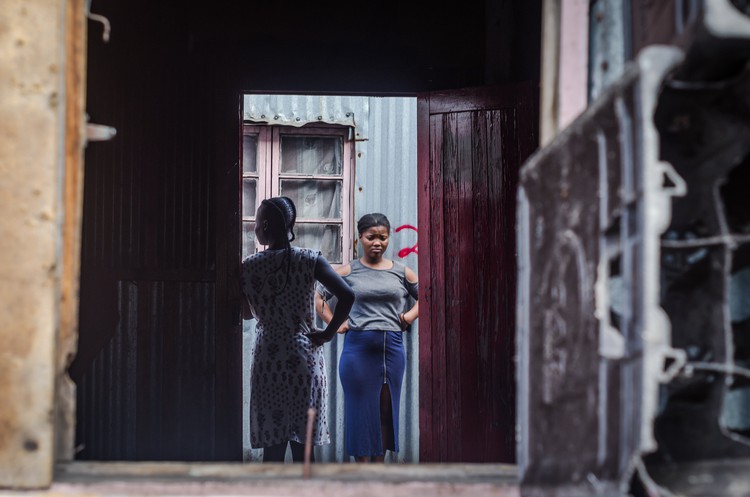
Residents of Lamontville Transit Camp were evicted by the City of eThekwini’s Security Management Unit and the Department of Human Settlements, in Lamontville South of Durban on Friday. The Durban High Court allowed them to return in a court ruling on Monday. Photo: Rethabile Phakisi for New Frame
19 June 2018
On Monday 18 June, the Durban High Court granted an urgent order that allows households evicted from the Lamontville Transit Camp to return to their homes. The households were evicted on Friday by the City of eThekwini.
The City has been given until 9 July 2018 to show why the order should not be made final. The order was given ex parte, meaning the City was not present in the court case because of the urgency with which it was brought.
The City moved families — who had themselves recently been evicted from the nearby Ekuthuleni shack settlement — into the transit camp homes left empty by Friday’s evictions, according to the local branch chairperson of Abahlali baseMjondolo, Sibongile Majola.
Majola said that after the court order the former Ekuthuleni residents will make way again for the households evicted from the transit camp by the City.
He says that the City is likely to facilitate the process on Tuesday.
Andile Bhengu — a 12-year-old who is visually impaired — and his family of 11 will be one of the families that will return to their home.
The dense rows of uninterrupted sheet-metal structures that make up the transit camp are set on a bed of thick concrete among marshland alongside the N2 highway.
According to the City’s acting Head of Communications, Mandla Nsele, the elongated structures are divided into 592 units.
Transit camps are designed to be temporary housing solutions, and according to Nsele the length of people’s stay at the transit camp was dependent on the completion of bulk services (e.g. sanitation and water) and the construction of houses elsewhere.
Numerous evictees, however, said that they had been living in the transit camp for ten years. According to their attorney, the Socio-Economic Rights Institute’s Nomzamo Zondo, none of the evicted households had been living there for less than two years.
A handful of blue shipping containers, which are the transit camp’s shared ablution facilities, are dotted among the homes.
These facilities are in a state of disrepair. One, for example, has a shallow layer of dirty water and waste dripping from the broken toilets, cisterns and shower heads, covering the floor.
Majola says that the temporary ablution facilities were never designed to service a permanent community, like the one that has lived at the Lamontville Transit Camp for the last decade.
Nsele says that the transit camp is “used to rotate families while upgrades are taking place in the informal settlements in Lamontville”.
He accused the evicted households of “attempting to queue jump the housing allocation process”.
Zondo, however, says that the City’s actions were “a clear case of an eviction without a court order”.
Zondo, who claims that some of the evicted households had initially been moved to the transit camp as a result of fire and flooding, said that families being evicted by the same municipality that had moved them into their homes represented “the most egregious breach of people’s rights”.
Residents that were evicted from the transit camp claim that a high-ranking municipal official told them that amaMpondo or IsiXhosa speaking people must vacate and will be replaced by IsiZulu speaking people.
The City denies that the official made any statement on the basis of ethnicity.